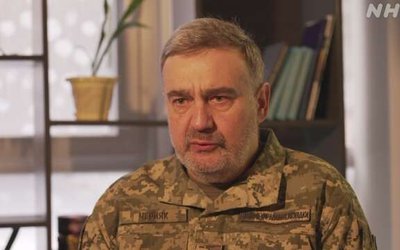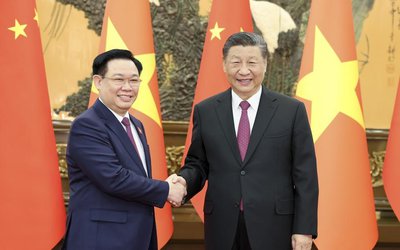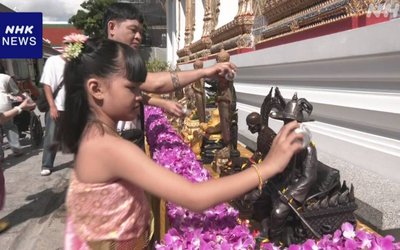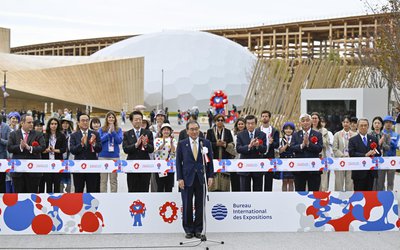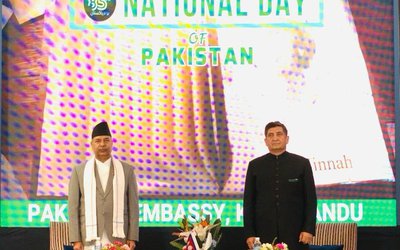
During my three-month internship as a writer for New Spotlight Magazine in Nepal, I sometimes thought about the Nepalese community in Belgium, my home country. I knew there were approximately 6,000 Nepalese living and working there, but I assumed they would be residing in the big cities like Brussels or Antwerp. The editor of the local city magazine I write for thought it would be a good idea to give me a column about my life in Nepal. During that assignment I met Madhu Poudyal, one of a few Nepalese living in Ronse, my hometown. We were in touch on Facebook and set up an interview. So last week, when I flew back home, my family took me to Mesopotamia, a restaurant, we go to from time to time, in the evening. I was tired of staying awake for more than 48 hours and I could not stop myself from falling asleep while eating. But then, Madhu popped up to say hi. What a chance, right?
This 47-year old gentleman has been living in Ronse for the past four years and works as a cook in Mesopotamia Restaurant.
“A master chef,” his best friend laughs out loud. “Before I came to Belgium, I lived in Germany. There I learned how to make food,” Poudyal says.
Mesopotamia serves pizza, pasta and kebab. No Nepali food. “Of course, I know how to make dal bhat. It may or it may not be tasty,” he grins. “I don’t eat dal bhat every day, not in Nepal and certainly not in Belgium. My breakfast consists of coffee and a cigarette. I only eat in the afternoon, before I start working. There are other ways in gaining calories than dal bhat.”
It was in 2004, Madhu Poudyal decided to leave his hometown Banepa. Earlier, he owned a travel agency which was closed down during the Maoist insurgency. After going through a financial crisis, he ended up in Germany.
“But Belgium is a far better place for economic starters,” Poudyal states. “The kind of job I am doing here, I would never do in Nepal. In Belgium, it doesn’t really matter whether you wash dishes or clean the roads, the payment is still good. But Nepalese won’t do this work in Nepal because the salary is way too low. That’s why many of them are jobless. It is a mentality problem, yes.”
He explains why almost 6 million Nepalese work abroad. “It is as if it’s the main goal of all Nepalese to work abroad. At any cost. A lot of them go to countries like Qatar or Malaysia where they get exploited. But at least they are out of the country. That mentality is growing. Those who get employed in a developed country won’t go back to Nepal. All of a sudden they have enough water, enough power and no more problems regarding transportation or human rights. So why would they go back? For the beauty of the country?” Poudyal smiles: “No, that is just a tourist thing.”
Poudyal is very much aware of the western European attitude towards foreigners: you can only integrate to the fullest if you adjust to the fullest. “I know many people come to Belgium to take advantage of the social protection. You can perfectly survive here, even without a job. The government takes care of you anyway. This is a negative spiral I especially see with foreigners coming from the Middle East and bringing all of their children over here. I dare say most of the Nepalese in Belgium work. It is just how we are,” he says in a modest way. “Integration is important and I am proud of my lifestyle. The fact that I am married inter-caste has nothing to do with integration. I already had made up my mind back in Nepal. The caste system is invented by people and it is completely random. In my opinion, there are only two castes in the world: male and female.”
Madhu considers himself to be a liberal person, a quality he inherited from his father. “I come from an educated family. When you are educated, people approach you with more respect,” he says. His dream was to become a doctor but due to his political involvement, Madhu had to adjust his plans.
“I used to be a student leader for ANFSU (All Nepal Free Students Union). I wanted to change the political system, in particular the autocratic monarchy. We held so many demonstrations against the government of that time. We tried and tried and tried… Ultimately there was a change with the Maoists. I never said it was a good one,” he laughs.
Clearly, there must be some differences between Nepalese and Belgian politics, right? “Nepal has so many leaders but none of them is visionary. They make the policy, only in their advantage. I don’t see that here in Belgium. Here, power is more decentralized.”
Madhu has his own definition of democracy. “It means: by the people, for the people and to the people. But which leader actually gives power to the people?” he asks, while sipping his coffee.
Although Madhu has a blast here in Belgium, he won’t stay forever. He will go back to Nepal, to be with his son and daughter who study in Kathmandu. “I will leave Belgium in three or four years, I think. Go back to my birthplace and do some farming. I will have to start from scratch. But that is my biggest dream,” he says.

Hanneke Vagenende
Vagenende is an intern from Belgium.
- PRISM WORK: No Waste
- Apr 28, 2013
- Eyes On the Journalist: A Risky Profession
- Mar 23, 2013
- PRISM: Helping Poor
- Mar 09, 2013
- Woes Of Street Kids
- Feb 23, 2013
- Nepali traffic: An adventure on its own
- Feb 10, 2013

